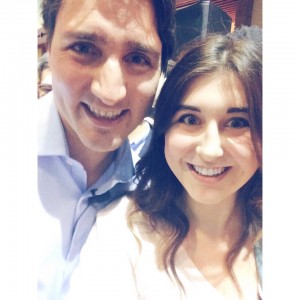On Wednesday, Liberal Party leader Justin Trudeau
came to UBC to discuss various issues in sight of upcoming elections. His speech inspired me to write a (two-part) blog post that combines observations based on the CAP Global Citizens courses: Geography and Arts Studies to begin with, followed by Sociology and Political Science in my next post. This work should demonstrate how the largely theoretical content gathered from this years’ coursework is at play in “real-life” political discourse.
Mr. Trudeau’s first thoughts were about place, as he explained his intimate connection to the city of Vancouver. He described his appreciation for the landscape, and his enjoyable experiences as a snowboard instructor and a UBC student. He quickly moved to an issue that is particularly relevant in this nature-surrounded city: the fundamental interdependence between the environment and the economy. He clearly outlined the need to protect natural resources and strengthen the economy simultaneously, stating that those two rely on each other and cannot be separated. He explained that there is no choice between “jobs and trees.”
By reading transcripts of his speeches in various parts of Canada, I have compared the first issues to be raised, and found that they show the importance of geography in shaping Trudeau’s political discourse: the use of local geopolitics, if you will. For instance, in Calgary his initial statement was about the importance of oil to the Canadian economy:
I support Keystone XL [pipeline]…it would create jobs and growth, strengthen our ties with the world’s most important market, and generate wealth.
Whereas his opening comments in Ottawa were about the needed diversity of the economy:
We need a smart economic plan for Canada that includes all regions and all sectors. A plan that includes small and big businesses – that includes all Canadians.
While it is evident that different parts of Canada will have differing priorities, it is important to recognize the adjustment of a political party’s focus based on the group of people it is speaking to, in response to place. This reminds me of the concept of kairos referred to by Miller & Sheppard in “Blogging as Social Action: A Genre Analysis of the Weblog.” The leader/party represents him/itself in a way that meets the time and space expectations in order to draw support from the community. It becomes clear that Justin Trudeau not only made use of his personal story (short autobiography) in the city of Vancouver in order to strengthen his presence and approachability to the UBC students, he also made careful note of his position in time and space in order to formulate a presentation that most effectively fit the predominant values of his audience.
I hope that I have begun to decode the art that is political speech, please read my upcoming post for further analysis!
